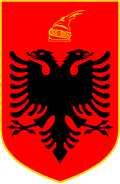 |
|---|
Parliamentary elections were held in Albania in April and May 1925.[ citation needed ] Ahmed Zogu was elected as president of Albania.
 |
|---|
Parliamentary elections were held in Albania in April and May 1925.[ citation needed ] Ahmed Zogu was elected as president of Albania.
Following the June Revolution in 1924, its leader Fan Noli became prime minister. With his government struggling to retain power, on 13 November he issued a decree for fresh elections to be held between 20 December 1924 and 20 January 1925.[ citation needed ] However, when Ahmet Zogu returned to the country in December, Noli fled and was replaced as prime minister by Iliaz Vrioni.
On 21 January Albania was declared a parliamentary republic,[ citation needed ] and on 31 January Zogu was chosen as the president. [1]
The new republic had a bicameral parliament, consisting of an 18-member Senate and a 57-member Chamber of Deputies. The Senate was to have twelve members elected by the public and six appointed by the president. [2]
A new electoral law was passed on 14 March.[ citation needed ] The elections remained on an indirect basis, with one elector nominated for every 500 registered voters. Those electors then elected the Deputies. [3]
As most opposition leaders had gone into exile, government candidates largely ran unopposed. As a result, voter turnout was very low. [4]